2017-18 Premier League DARTS, Week 33: Why the Manchester Derby was a game of two halves
Welcome to Premier League DARTS, FC Yahoo‘s weekly EPL column that will run every Monday or Tuesday morning. Why “DARTS”? Because Henry Bushnell will recap the weekend’s biggest games with Discussion, Analysis, Reactions, Takeaways and Superlatives. All of that is below. But first, a brief intro …
How do we decide when sport matters and when it does not?
It was a question to ponder this past weekend, because the Premier League’s marquee match will not have a meaningful impact on its final result. Manchester City, the champions-elect, hosted Manchester United in game far less significant than City’s three days earlier and three days later.
But try telling the thousands of sky blue-clad fans who filled the Etihad with unusual, unceasing noise on Saturday that the Manchester Derby didn’t matter. Try telling the ones who looked seasick during United’s second-half barrage. Try telling the ones glued to their seats 15 minutes after the final whistle, tears rolling down their cheeks, a 3-2 defeat already haunting them. And try telling the players, who, in the moment, couldn’t have cared less about the Champions League.
Sport matters if it matters to those who contest it. It often matters to those who contest it if it matters their followers who care about it, and vice versa. Sport is competition, and is imbued with meaning by the intensity of those who compete, a league table be damned.

So sure, Pep Guardiola rested some starters. But only three. He went for it – because it mattered. And thank goodness he did. He, Jose Mourinho and the 28 players who graced the Etihad pitch gave us one of the spectacles of the season. Or rather two of them. Because the 176th Manchester Derby will be remembered as one of two halves.
1. United’s man-to-man problems
City’s goals came from a corner and a goalkeeper giveaway, but its first-half dominance was far more thorough than that. The home side led the halftime Expected Goal tally 2.2-0, and only 0.5 of the 2.2 were the two goals. United, meanwhile, didn’t have a single shot. City bossed the game in every way imaginable.
It bossed it largely because of structural advantages when in possession. The teams lined up in identical 4-3-3s, with a single holding midfield pivot. And that’s where United’s problem festered. The Red Devils stuck to a man-to-man defensive scheme, which left Nemanja Matic responsible for his opposite number, Fernandinho. But Matic, afraid of being dragged away from his duty as backline shield, rarely pressed Fernandinho until the Brazilian carried the ball forward into the attacking third.
The result was time and space for City’s pivot in the middle of the park. Time and space to pick out incisive passes:
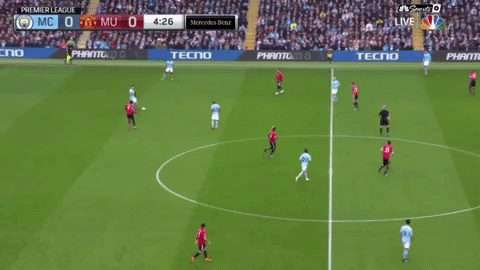
Occasionally Matic would stray from his midfield anchor role. But when he did, David Silva would drift into the vacated space – or City’s false 9 would drop into it, pulling a center back with him, a maneuver that gave United all kinds of fits.

2. Pep’s false 9 swap
Playing without a true striker, Guardiola’s side began with Bernardo Silva as a central attacker. Less than 20 minutes in, though, Bernardo swapped with Raheem Sterling. Sterling’s movement changed the game.
Some false 9s can make impacts by getting on the ball, but Sterling’s movement off it had United heads spinning. His ability to stretch the back line with runs in behind was important, but it was his activity checking in and out of that space behind Matic that really opened United up. Eric Bailly, adhering to the man-marking scheme, would follow. City midfielders would take advantage:
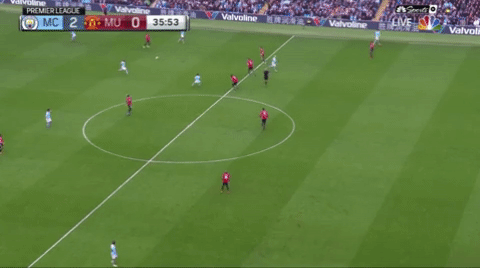
Bailly, in large part due to David Silva’s ability to lose Herrera, was all over the place in the first half. Sterling spurned two glorious chances – one can be attributed to a bobbly pitch. But still, City found itself 2-0 up at halftime thanks to Vincent Kompany and a stumping press.
3. United’s problematic set-piece defending
Before we get to the best part of Kompany’s goal, a word about United’s set-piece defense. The Red Devils have conceded nine times from dead-ball situations this year, the most of the Big Six. And Kompany helped explain why.
There’s a disconnect here between Smalling’s body shape and the scheme behind him. With only one zonal marker on the six-yard box (Romelu Lukaku), and with a second seemingly available to pick up back-post runs (Bailly), surely Smalling shouldn’t be giving Kompany a free run at the near post:
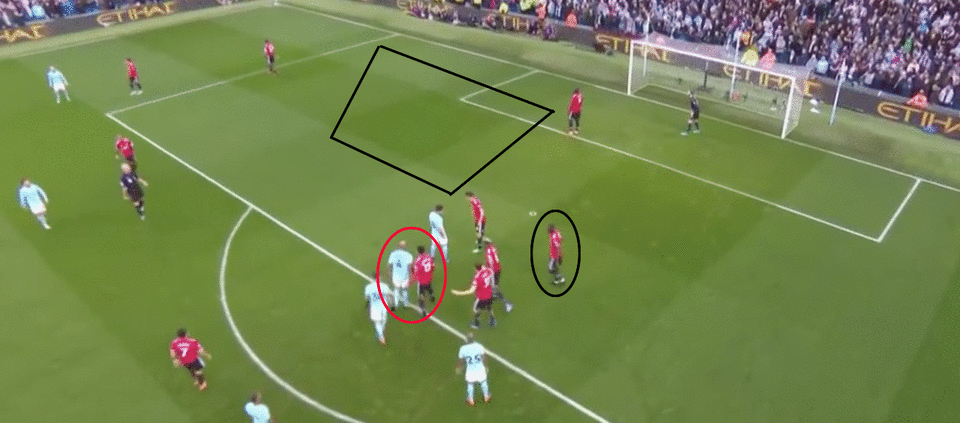
Of course, Smalling’s marking was so poor that he instead gave Kompany a free run right at goal. Lukaku’s strange decision to not attack the ball can also be faulted. But when one of the most physically imposing teams in the Premier League has conceded at least two more set-piece goals than any of its closest rivals, chances are the problems go beyond a few individual mistakes.
4. Shades of 2012
It’s blasphemous to tab a header off a corner as a favorite of five goals in a thrilling match. But I loved so much about Kompany’s opener. Why?
Because of the eerie similarities to the one that beat United six years ago.
Vincent Kompany. Chris Smalling.
2012. 2018. pic.twitter.com/6KsRkOKhkB
— Henry Bushnell (@HenryBushnell) April 7, 2018
— Henry Bushnell (@HenryBushnell) April 7, 2018
5. City’s second, and the press that enabled it
City’s second goal, admittedly, was all about Sterling and Ilkay Gundogan in the box. But David De Gea’s errant kick that led to it? That was a product of City’s pressing tactics.
The Citizens stick to their 4-3-3 shape at times, but when the press was triggered and the ball was at the feet of a United center back, City went to a 4-1-3-2 of sorts. One of the two more advanced central midfielders, David Silva or Gundogan, stepped up to hound the ball-carrier. The other pushed centrally toward Matic. And the wingers dropped, often to split the difference between United’s fullbacks and midfielders, depending on various factors.
That’s how City forced United’s possession all the way back to De Gea in the 30th minute:

And it’s why De Gea’s attempt to pick out Antonio Valencia instead found Leroy Sane near midfield:
It’s one of many reasons United found itself 2-0 down after 45 minutes.
6. The turnaround, part 1
The goal that brought United back into the game was a knock-on effect of one solution to one first-half problem. This was City’s last spell of possession before its net had been punctured:
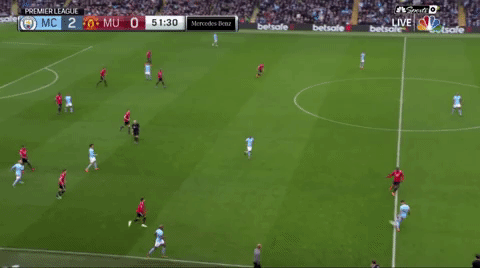
The solution to the Fernandinho conundrum was to have the ball-side winger continue his pressing run toward City’s defensive midfielder. That meant Matic could stay at home and cut off forward passing lanes. In this case, it allowed Lingard to hound Fernandinho into a turnover, with the help of Alexis Sanchez clamping down from the opposite wing. A minute later, it was 2-1:
7. The turnaround, part 2
Another problem Mourinho needed to solve at halftime was his team’s lack of an outlet to bypass City’s press. His counteractive tweak was to have Lukaku occasionally swap with one of the wingers to pin himself to a fullback rather than Kompany or Nicolas Otamendi.
City often funneled the ball from a United fullback back to a center back who had no clear passing options. The subsequent long balls were aimless. Mourinho needed to give his defenders someone to aim for whom they could count on to win 50/50s.
Lukaku, especially up against Fabian Delph, fit the bill. And that matchup played a crucial part in the buildup to the second goal:

Because City had pressed Valencia and Bailly, there was space for Lingard, Matic and Pogba to swing the ball through midfield, out to Sanchez on the left. Sanchez set up Pogba for an unstoppable equalizer.
8. Alexis Sanchez’s choreography
As for the winner? Sanchez noticed City’s high defensive line, and promised his teammates he’d deliver. He urged them to get behind that defensive line to receive:

And, well, he and they did:
9. The first penalty shout
City, on balance, deserved to win the game. Let’s make that very clear. The Citizens were the better team throughout the 90 minutes. They shouldn’t have needed a penalty to avoid defeat. That said, though, they probably should have had two.
The first incident was an especially fascinating case. Ashley Young, attempting to adjust his feet to clear David Silva’s low cross in the fifth minute, slipped. The ball, destined for Sterling at the far post, struck Young’s hand while he was lying on the ground.
100% a handball on Ashley Young. 100% a penalty. Not sure why we’re overthinking this… pic.twitter.com/i9sFwEDEwO
— Henry Bushnell (@HenryBushnell) April 7, 2018
By a strict reading of the laws of the game, which state that a handball must be a “deliberate act,” Young’s wasn’t an infraction. But based on precedent – based on how the law has been interpreted by referees for years – it absolutely was.
“Deliberate,” rather than being defined as “intentional,” has come to be defined by the answer to the question, “could the player have realistically prevented the ball from hitting his arm?” That’s why you hear about arms in “unnatural positions” and “the distance between the opponent and the ball,” which the rulebook specified as a consideration. Players have been imbued with a certain amount of responsibility to avoid ball-to-hand contact.
And Young, obviously, could have avoided this. It doesn’t matter that the arm position was natural given his slip. He could have avoided it by not slipping. He didn’t get blown over by divine force. He made a footwork mistake, and as a result, the ball hit his hand. Just think if Young had slid to block a shot on the goal line, only for it to hit his outstretched trailing arm and stay out of the net. Would there be any question about penalty or no penalty then?
Of course not. And this is essentially the same.
10. The second penalty shout
Now chasing the game, City had a second claim that was denied. Young was the guilty party again. He slid to win a ball away from Sergio Aguero, and did just that. But he went into the challenge with his studs exposed, went into and then over the ball in dangerous fashion, very nearly seriously injured Aguero.
How did Atkinson miss this?
Should have been a penalty and straight red for Young for this silly career threatening tackle on Aguero pic.twitter.com/2lWQJW1tc0— Sports Unlimited (@Alonso6madrid) April 8, 2018
Penalties aren’t often given for this type of challenge. Contact with the ball is usually sufficient to avoid punishment in the box. But Young’s exact tackle, had it been performed in midfield, would have been a certain foul and quite possible a red card. It shouldn’t have been considered any differently in the penalty area. Aguero should’ve been heading to the spot to tie the game.
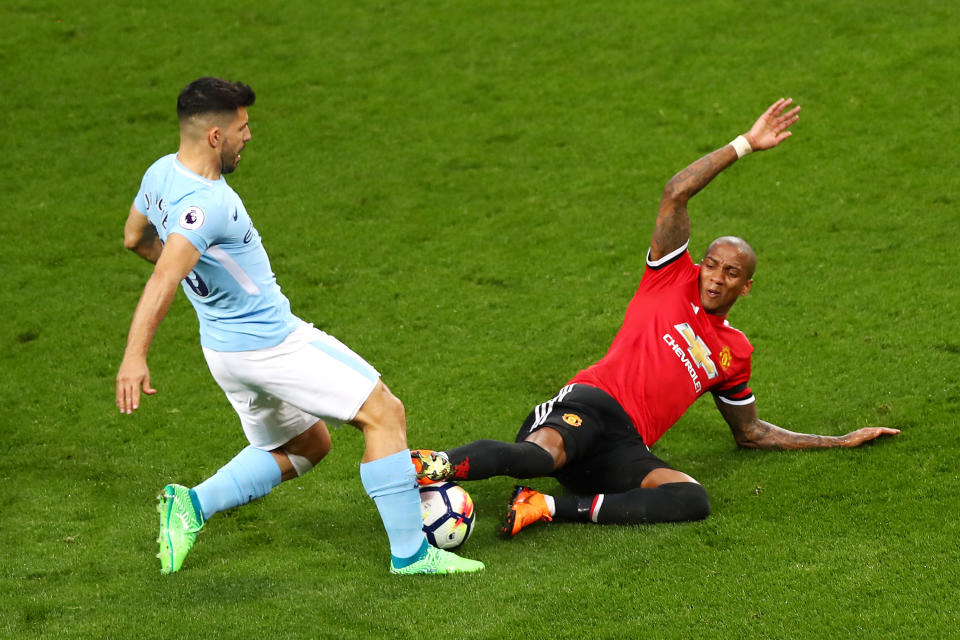
Alas, none of the injustice, nor the missed chances, will prevent City from lifting the title. Against any other opponent, it all would have been forgotten by Sunday dawn. But this was the derby. This mattered. And all of it – the non-calls, the 1-v-1s squandered – will be the source of lasting heartache.
Previous DARTS: Week 1 | 2 | 3 | 4 | 5 | 6 | 7 | 8 | 9 | 10 | 11 | 12 | 13 | 15 | 16 | 18 | 19 | 20 | 22 | 23 | 24 | 26 | 27 | 28 | 29 | 30 | 32
– – – – – – –
Henry Bushnell covers global soccer, and occasionally other ball games, for Yahoo Sports. Have a tip? Question? Comment? Email him at henrydbushnell@gmail.com or follow him on Twitter @HenryBushnell.



